Alchemy Works Incense & Resins
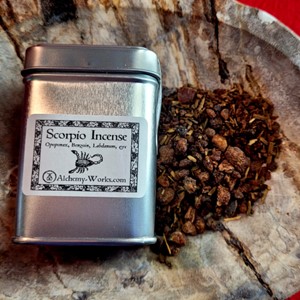
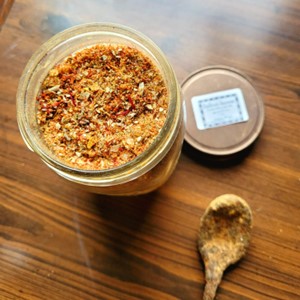
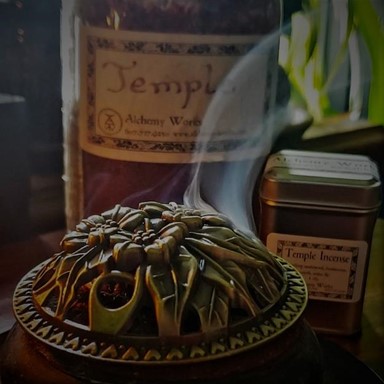
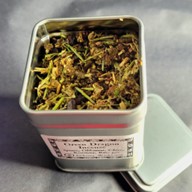
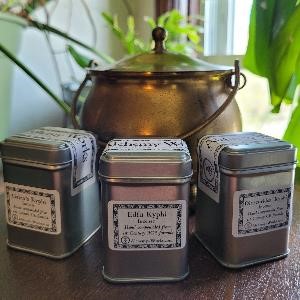
Burning incense and fragrant resins has been an important part of spiritual practice for millenia, including ancient and modern Paganism, Traditional Witchcraft, Wicca, and various forms of ceremonial magic. Our loose incenses are crafted from personal recipes or historically accurate formulas, drawing inspiration from sources such as the Ebers Papyrus and Dioscorides' Materia Medica. We compound each incense by hand using traditional methods, employing a stone mortar and pestle, and grinding only a few ounces at a time. Our all-natural loose incense contains plant materials that we grow and gather ourselves, or that are sourced from suppliers committed to sustainable, high-quality botanicals. The resins that we sell are the same ones we use, and we encourage you to experiment with creating your own blends.
Whether for purification, meditation, connecting with the divine, creating a sacred space, or simply enjoying the fragrance, we highly recommend natural loose incense, which is the oldest and most traditional form. This type of incense carries a depth of scent and a connection to the Earth that petrochemical-based fragrances simply can't match. Though loose incense takes a bit more effort to burn, the results are well worth it—and a small amount goes a long way! Click here for tips on using loose incense.
|
Abramelin Incense - French & German
Benzoin Resin - Thai & Sumatran Dragon's Blood Resin - Sumatran & Socotran Elemental Incenses - Salamander, Sylph, Undine & Gnome |
Flowers of Venus
Fruits of Jupiter
Golden Dawn Style Angelic Incenses - Raphael, Gabriel, Michael, & Uriel Holiday Incenses - Midsummer, Nemoralia, etc. |
Nemoralia Incense
Paths in the Dark Incense (Saturn) Resins of the Sun Roots of SaturnSalamander Elemental Fire Incense Seeds of MercuryTagriel Incense - Love & Affection Tetragrammaton Incense - Crowley's Recipe Trickster/Teacher Incense (Mercury) Undine Elemental Water Incense Vernal (Spring) Equinox Incense Woods of Mars |
We measure incense by weight, not volume, and package it in resealable square tins. Viscous resins are shipped in glass vials, and dry resins in glassine bags—an eco-friendly alternative to plastic. There are many more botanicals, including other fragrant woods like red and white sandalwood and cedar, that make excellent natural incense in our herbs section.
If you're mixing your own incense, we recommend using a large stone mortar and pestle to grind ingredients. Our primary mortar is unpolished granite, 8 inches in diameter, with a rough texture—similar ones can be found in kitchen supply stores. We usually grind herbs and resins together, as the hardness of the resins helps break down tougher herbs like lemongrass or myrtle. It's best to work in small amounts—no more than two ounces at a time—to ensure even grinding, especially with roots and woods that require more effort. Once ground, we combine everything in a large bowl, adding any powdered or wet ingredients like wine, viscous resins, or essential oils, and stir until well mixed. After drying, store your incense in an airtight container, such as a mason jar or tea tin.
Some tips: A heavy-duty coffee grinder can also break down ingredients, but it may gum up with resins and struggle with roots or woods. Adding sugar or honey can increase smoke and sweeten the scent, while dried fruit soaked in wine is great for binding powdered resins, especially in Venus blends. Heat thick resins like labdanum slightly to make them easier to work with, and always let your incense dry fully before storing to prevent mold. Even when dry, some resins may leave the incense feeling sticky.
© 2004-2024 Alchemy Works; No reproduction without permission
Alchemy Works products are offered for use in spiritual, ritual, meditative, and magical practices, not for medicinal or cosmetic purposes. The information on this website is provided for its folkloric, historic, and magical value. It is not intended to be a substitute for professional medical advice, diagnosis, or treatment.